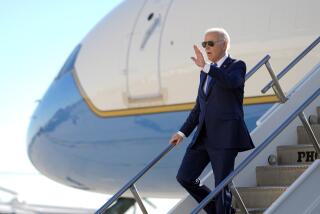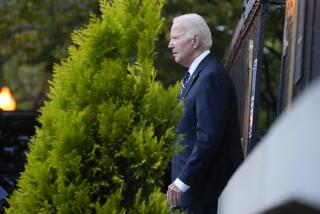Senate widens probe of destroyed tapes
Lawmakers leading the Senate investigation of the CIA’s destruction of interrogation videotapes said there were gaps in the testimony of CIA Director Michael V. Hayden on Tuesday and outlined plans to call a series of witnesses as part of an expanding probe.
“We had a useful and not yet complete hearing,” said Sen. John D. Rockefeller IV, chairman of the Senate Intelligence Committee, in comments after the 90-minute, closed-door session with the CIA director.
“There are a lot of questions to be answered.”
Hayden said that he sought to lay out a chronology of the agency’s decision to begin taping interrogations of terror suspects in 2002 -- during which agency officers employed a range of harsh methods -- as well as the decision to destroy the recordings three years later.
“I had a chance to lay out a narrative of the history of the videotapes, why the agency did it, why they were destroyed,” Hayden said in brief comments after the classified hearing.
But Hayden stressed that he was not director when the tapes were made or destroyed.
“There are other people in the agency who know about this far better than I,” he said, “and I’ve permitted them to come on down and answer all the questions the committee might have.”
Among those expected to testify in the coming weeks are the CIA’s acting General Counsel John Rizzo, as well as the former head of the agency’s operations branch, Jose A. Rodriguez, Jr., who authorized the destruction of the tapes in 2005.
Rodriguez’s decision is a focus of the Senate Intelligence Committee probe, as well as an internal investigation launched by the CIA and an inquiry by the Justice Department.
Senate Intelligence Committee officials said the panel plans to issue a public report on its investigation after the Justice Department inquiry is finished.
Atty. Gen. Michael B. Mukasey, addressing the destruction of the tapes Tuesday for the first time, resisted calls for an independent prosecutor.
“I think the Justice Department is capable of doing whatever it appears needs to be done” to determine whether the CIA broke any laws, Mukasey said during his first news conference since he was sworn in as attorney general on Nov. 9.
Asked about prospects for an independent counsel, Mukasey said that issue “isn’t going to be faced until it has to be. And if it has to be, it will be.”
Hayden’s testimony Tuesday focused on internal records that the CIA has gathered as part of its own internal probe.
Sen. Christopher S. Bond of Missouri, the ranking Republican on the Senate Intelligence Committee, said Hayden’s testimony was “forthcoming based on what he could discover from the record. We look forward to hearing from people who were actually there” and involved in the decisions to destroy the tapes.
The tapes depicted CIA officials’ use of harsh methods during the 2002 interrogations of Al Qaeda suspects Abu Zubaydah and Abd al-Rahim al-Nashiri.
Zubaydah, who is alleged to have had ties to the Sept. 11 plot, was subjected to a suffocation technique called waterboarding in which a prisoner’s face is covered with cloth and doused with water.
John Kiriakou, a former CIA officer involved in the capture of Zubaydah, said in a series of television interviews this week that Zubaydah had been uncooperative under questioning, but relented after 35 seconds of exposure to the waterboarding technique.
In a statement sent to the CIA workforce last week, Hayden said that the agency destroyed the tapes only after it was determined that they were “no longer of intelligence value and not relevant to any internal, legislative, or judicial inquiries.”
But the disclosure prompted questions of whether the agency had illegally destroyed evidence. And new details have surfaced suggesting significant disagreements among top agency officials over a two-year period before the tapes were destroyed.
Former CIA officials said that Porter J. Goss, who was agency director in 2005, had opposed the destruction of the tapes during meetings in which the issue was discussed. Senior agency lawyers also cautioned against doing so, although some had advised Rodriguez that it might not violate any laws to destroy the recordings.
Rep. Rush D. Holt (D-N.J.) on Tuesday became the first lawmaker to formally request that Mukasey immediately appoint an independent counsel.
Neither the CIA’s inspector general nor the Justice Department can fairly and independently investigate the matter, according to Holt, a member of the House Intelligence Committee and the chairman of its oversight subcommittee. He said the CIA has misrepresented the facts surrounding the existence and subsequent destruction of the videotapes.
He said the misrepresentations included what the CIA provided to a federal court and an appeals court that were handling the prosecution of terrorism suspect Zacarias Moussaoui, who pleaded guilty to conspiracy charges in 2005 and was sentenced to life in prison.
In addition, the Justice Department’s Office of Legal Counsel has been directly involved in writing a series of often controversial legal opinions supporting the administration’s aggressive detainee interrogation policies, Holt noted in his letter to Mukasey.
Mukasey, a federal judge for more than two decades, drew widespread criticism during his confirmation hearing when he refused to say whether he considered waterboarding a form of torture.
Now that he is the attorney general, he said Tuesday, he is reviewing the legal opinions on interrogation to see whether they are “sustainable” and whether the CIA conforms to them.
Hayden is scheduled to appear before the House Intelligence Committee today.
Times staff writer Josh Meyer contributed to this report.
More to Read
Start your day right
Sign up for Essential California for news, features and recommendations from the L.A. Times and beyond in your inbox six days a week.
You may occasionally receive promotional content from the Los Angeles Times.






